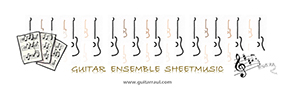David J. Buch
https://www.academia.edu/44600
The most influential and foundational modern Spanish guitarist-composer is Francisco de Asís Tárrega y Eixea (1852-1909). Both in regard to technique and repertory, Tárrega extended the Spanish guitar tradition and established an international one, alloyed with the “romantic” style, repertory and transcription from other media. His devoted students Miguel Llobet, Emilio Pujol, Josefina Robledo and Daniel Fortea transmitted his music and teachings, which reached Andrés Segovia and virtually all of his followers. Tárrega’s compositions and transcriptions are in the repertory of almost every ‘classical’ guitarist, and his most renown pieces have transcended the instrument and entered broad popular culture as no other guitarist-composer’s works.
One of Tárrega’s most admired and performed compositions, Recuerdos de la Alhambra, has been known through an early 20th-century publication edited by Tárrega and dedicated as an homage to the French guitarist Alfred Cottin. But in 1991 an autograph manuscript came to light that provided a more precise context for the origin of this rhapsodic tremolo study. The manuscript bears the date December 8, 1899 and has a different title: Improvisación !A Granada¡ Cantiga Árabe. An inscription at the end indicates that the work was composed as a name-day gift to a woman who was Tárrega’s student, maecenas and possible muse. The dedication reads “To my eximious disciple Sra. Dª Conchita G. De Jacoby / [from] your teacher and friend / Franco Tárrega. / Màlaga 8 Diciembre 1889″ (A mi eximia discípula Sra. Da…)
Concepción Gómez de Jacoby: Tárrega’s Enigmatic Patron and Recuerdos de la Alhambra





